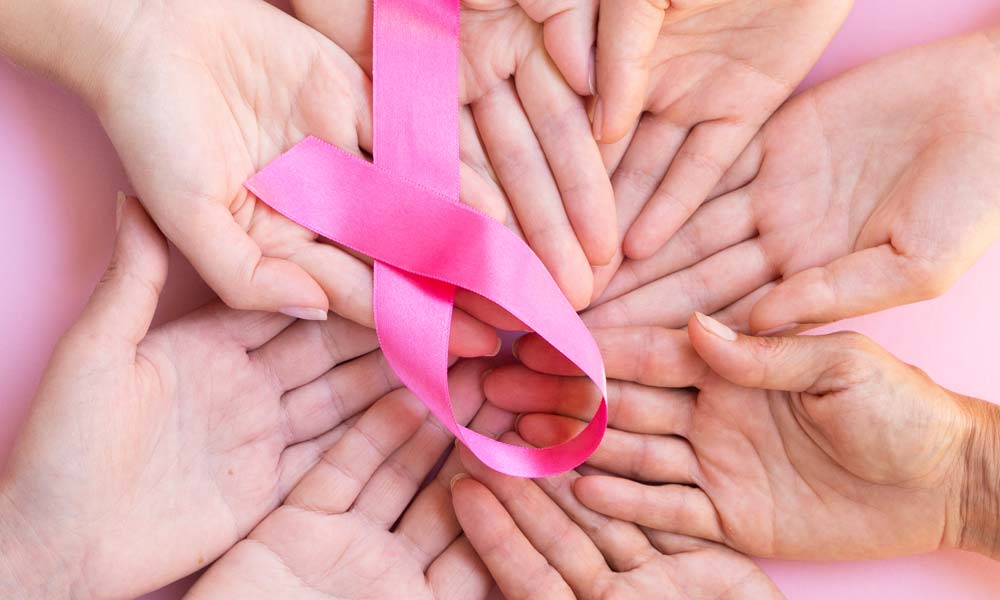Salud
¡No todo es cáncer!
Publicado
5 años antesel

Pese a casi entrar en el año 2021 existen muchas mujeres que no conocen la infinidad de enfermedades que pueden afectar sus senos, mismas que no necesariamente pueden desencadenar un cáncer.
Para conocer de dichas enfermedades, Visionarias platicó con el doctor Genaro Tamayo Pérez, especialista en patología de las glándulas mamarias y director de la Clínica de Patología Mamaria SenX, quien nos ayuda a comprender la estructura de esta parte del cuerpo, así como los tipos de padecimientos que pueden afectarla.
Sobre las mamas, el especialista nos explica que estas tienen una “estructura extraordinaria”, lo que no impide que lleguen a sufrir diferentes tipos de enfermedades, las cuales se pueden dividir en congénitas, es decir desde el nacimiento, como por ejemplo cuando las mujeres nacen sin la estructura o sólo con una parte de esta.
También están las enfermedades que llegan a aparecer durante el desarrollo (como la falta de desarrollo, que se desarrollen mucho o que una mama crezca más que la otra). Además, existe la posibilidad de la presencia de tejido mamario fuera del lugar habitual (para los humanos), así como lesiones benignas, las cuales, según explica el doctor Tamayo son más que las malignas.
El médico agrega que cada tipo de enfermedad o lesión tiene variables que generan comportamientos diferentes en las mujeres, lo cual dependerá de su estado de salud, edad, genética y otros detalles que se deben evaluar para determinar que tanto el padecimiento afectará a la mujer o que tratamiento es el que se debe de seguir en cada una de ellas.
¿Cuándo sí preocuparnos?
Cuando la lesión es maligna es importante que se detecte a tiempo, ya que esto permitirá una mejor atención y se asegurará el bienestar de la paciente.
Las lesiones malignas se dividen en linfoma, sarcoma y el carcinoma; de este último hay dos variedades, el In-situ y el invasor, donde el invasor tiene más de 27 tipos, entre ellos el ductal, el cual es el más común.
“En la actualidad las mujeres se sienten algo, o les duele algo o les dicen que tal vez hay algo y automáticamente lo asocian con el cáncer y con la muerte, lo cual es totalmente falso, si bien algunas de ellas pueden fallecer por la enfermedad, esto está dado más por la etapa (tardía) en la cual se detectó el padecimiento, algunas características de la lesión y la presencia de otras comorbilidades”, menciona el doctor Tamayo.
Por lo anterior, es importante la detección temprana de las lesiones mamarias, para evitar que se llegue a un cáncer avanzado.
No todo es verdad en Internet
El especialista señala que buscar los padecimientos en Internet resulta confuso para las mujeres, ya que es un lugar donde no toda la información es verídica y frecuentemente es contradictoria, incorrecta o imprecisa, y aunque en algunos casos sea correcta, el manejo siempre se debe individualizar, pues cada persona es diferente, desde su genética hasta sus hábitos y esto puede variar el tratamiento.
¿Cómo prevenirlo?
“El grupo más grande de sobrevivientes de cáncer en el mundo es el de sobrevivientes de cáncer de mama”, confirma Tamayo, quien comparte que una de las campañas más constantes en el tema es la de la autoexploración, acción que no muchas mujeres realizan, pues no es un hábito en ellas.
Ante esto el especialista señaló que la mejor manera de enseñar la práctica de la autoexploración es inculcarlo desde niñas y hace énfasis en que las pequeñas lo aprenden casi jugando, por lo que deben saber cómo hacerlo correctamente, es decir con las yemas de los dedos en forma circular y con el brazo detrás de la cabeza, ya que de esta forma cualquier “bolita” será fácil de detectar.
“Si desde niñas se les fomenta el hábito de la autoexploración y se les enseña a que no todo es cáncer, esto ayudará a que ellas vean la autoexploración como algo normal y no les va a dar miedo de ir al médico, con esta pequeña enseñanza podremos bajar aún más la tasa de mortalidad por el cáncer de mama”.
Y ya arriba de 40 años perder el miedo a realizarse el estudio de la mamografía que sigue siendo el método más aceptado de vigilancia y detección temprana.
En conclusión, se puede decir que hablar de cáncer de mama no está mal, pero es necesario hacerlo con conciencia y proactivamente, generando un análisis racional, ya que la gran mayoría de las lesiones no son cáncer y la confianza de que aun si es un cáncer es una enfermedad se puede superar. Así que a cuidarnos y recordar que: No todo es cáncer.

Contacto o citas:
Dr. Genaro Tamayo Pérez
656-611-15-08
656-227-19-85
01-800-606-04-04 Ext. 4800
genarotamayofacs@hotmail.com
Not everything is cancer!
Despite we are almost entering the year 2021, there are many women who don’t know the kinds of diseases that can affect their breasts, which may not necessarily trigger cancer.
To learn about these diseases, Visionarias spoke with Dr. Genaro Tamayo Pérez, specialist in pathology of the mammary glands and director of the SenX Breast Pathology Clinic, who helps us understand the structure of this part of the body, as well the types of conditions that can affect it.
Regarding the breasts, the specialist explains that they have an “extraordinary structure”, which doesn’t prevent them from suffering different types of diseases, which can be divided into congenital, that is, from birth, such as when women are born without the structure or only with a part of it.
There are also diseases that appear during development (such as lack of development, developing a lot or one breast growing more than the other). In addition, there is the possibility of the presence of breast tissue outside the usual place (for humans), as well as benign lesions, which, according to Dr. Tamayo, are more than malignant.
The doctor adds that each type of disease or injury has variables that generate different behaviors in women, which will depend on their health, age, genetics and other details that must be evaluated to determine how much the disease will affect the woman or what treatment should be followed in each of them.
When should we worry?
When the lesion is malignant, early detection it’s important, as this will allow better care and ensure the patient’s well-being.
Malignant lesions are divided into lymphoma, sarcoma, and carcinoma; There are two varieties of the carcinoma, the In-situ and the invasive, which has more than 27 types, including the ductal, which is the most common.
“Nowadays women feel something, or it hurts something, or somebody tells them that maybe there’s something, they automatically associate it with cancer and death, which is totally false. Although some of them may die from the disease, this happens by the (late) stage in which the condition was detected, some characteristics of the injury, and the presence of other comorbidities”, says Dr. Tamayo.
Therefore, early detection of breast lesions is important to prevent advanced cancer from developing.
Not everything on the Internet is true
The specialist points out that searching for conditions on the Internet is confusing for women, since it’s a place where not all the information is true and is frequently contradictory, incorrect or imprecise, and although in some cases it’s correct, the management must always be individualized , because each person is different, from their genetics to their habits, and this can vary the treatment.
How to prevent it?
“The largest group of cancer survivors in the world is breast cancer survivors”, confirms Tamayo, who shares that one of the most constant campaigns on the subject is the self-examination, an action that not many women carry out. It’s not a habit in them.
Given this, the specialist pointed out that the best way to teach the practice of self-exploration is to instill it from girls and emphasizes that little girls learn it almost by playing, so they must know how to do it correctly, that is, with the fingertips in circular shape and with the arm behind the head, because in this way any “ball” will be easy to detect.
“If the habit of self-examination is encouraged and girls are taught that not everything is cancer, this will help them to see self-examination as something normal and they will not be afraid of going to the doctor, with this little lesson we can lower the mortality rate from breast cancer even more ”.
Women over 40 years of age most lose the fear of having a mammography study, which is still the most accepted method of surveillance and early detection.
In conclusion, it can be said that talking about breast cancer is not wrong, but it’s necessary to do it conscientiously and proactively, generating a rational analysis, since the majority of lesions are not cancer and the confidence that even if it’s a cancer is a disease can be overcome. So to take care of ourselves and remember that: Not everything is cancer.

Contact or appointments:
Dr. Genaro Tamayo Pérez
656-611-15-08
656-227-19-85
01-800-606-04-04 Ext. 4800
genarotamayofacs@hotmail.com
Salud
Videojuegos: ¿afición divertida o adicción silenciosa?
Publicado
2 meses antesel
01/08/2025Por
Marisol Parra
Los videojuegos son una forma popular de entretenimiento, pero su uso excesivo puede afectar la salud física, mental y emocional.
Hoy en día, los videojuegos han pasado de ser un pasatiempo ocasional a ocupar un lugar protagonista en el tiempo libre de niños, adolescentes e incluso adultos. Gracias al desarrollo del mundo virtual y a la enorme variedad de temáticas y estilos, es fácil entender por qué se han convertido en uno de los entretenimientos favoritos, solo por detrás de las redes sociales.
Pero como en todo, el equilibrio es clave. Para algunas personas, jugar puede ser una actividad sana, controlada y hasta enriquecedora. Sin embargo, para otras, puede transformarse en una adicción con consecuencias reales y preocupantes. Detrás de cada juego hay estrategias bien pensadas basadas en neurociencia: recompensas constantes, desafíos superables, sensación de logro inmediato… Todo esto estimula la liberación de dopamina en el cerebro, una sustancia relacionada con el placer. ¿El resultado? Queremos más y más. Y cuando perdemos el control del tiempo o dejamos de hacer cosas importantes por seguir jugando, hablamos de una posible adicción.
Esa compulsión puede hacer que una persona posponga o abandone actividades básicas como estudiar, trabajar, dormir o convivir con su familia. En estos casos, incluso es común experimentar ansiedad o irritabilidad cuando no se puede jugar, lo que indica síntomas de abstinencia.
El abuso prolongado de videojuegos puede afectar diferentes áreas de la vida. Aquí algunos efectos que conviene conocer:
- Salud mental: irritabilidad, ansiedad, depresión, alteraciones del sueño, trastorno por déficit de atención (TDAH), dependencia emocional del juego.
Salud física: vista cansada, dolores musculares por malas posturas, insomnio.
Comportamiento: conductas desafiantes, baja tolerancia a la frustración, respuestas agresivas.
¿Cómo jugar de forma saludable?
Los videojuegos también tienen beneficios: desarrollan la creatividad, el pensamiento lógico y pueden fomentar la conexión social. Lo importante es establecer horarios, respetar rutinas y equilibrar el juego con otras actividades. En el caso de niños y adolescentes, los padres deben supervisar y poner límites claros, La Organización Mundial de la Salud (OMS) reconoce la adicción a los videojuegos como un trastorno mental, por lo que es importante prevenir, observar cambios de conducta y, si es necesario, buscar ayuda profesional.
Los videojuegos pueden disfrutarse, pero con control. El equilibrio es la clave para que sigan siendo un pasatiempo sano y no un problema en casa.
Video Games: Fun Hobby or Silent Addiction?
Video games are a popular form of entertainment, but excessive use can affect physical, mental, and emotional health.
Nowadays, video games have gone from being an occasional pastime to taking center stage in the free time of children, teens, and even adults. Thanks to the development of virtual worlds and a vast variety of themes and styles, it’s easy to understand why they’ve become one of the most popular forms of entertainment — second only to social media.
But as with everything, balance is key. For some, gaming can be a healthy, controlled, and even enriching activity. For others, it can turn into an addiction with serious and concerning consequences.
Behind every game, there are carefully designed strategies based on neuroscience: constant rewards, achievable challenges, and an immediate sense of accomplishment. All of these stimulate the release of dopamine, the brain’s pleasure chemical. The result? We want more and more. And when we lose track of time or begin to neglect important responsibilities just to keep playing, we may be dealing with a potential addiction.
This compulsion can lead someone to delay or abandon basic activities such as studying, working, sleeping, or spending time with family. In more serious cases, it’s common to experience anxiety or irritability when not playing — signs of withdrawal.
How Gaming Affects Daily Life
Prolonged video game abuse can negatively impact various areas of life. Here are some common effects:
Mental health: irritability, anxiety, depression, sleep disturbances, ADHD symptoms, and emotional dependence on gaming.
Physical health: eye strain, muscle pain due to poor posture, and insomnia.
Behavior: defiant behavior, low frustration tolerance, and aggressive reactions.
How to Game in a Healthy Way
Video games can also have positive effects: they can enhance creativity, logical thinking, and even social connection. The key is to set time limits, respect routines, and balance gaming with other activities.
For children and teens, parental supervision and clear boundaries are essential. The World Health Organization (WHO) has recognized gaming disorder as a mental health condition, making prevention and observation of behavioral changes crucial. If needed, seeking professional help is recommended.
Video games can be enjoyed — but with control. Balance is the key to keeping gaming a healthy and fun hobby rather than a problem at home.

Relaciónate sanamente con tus alimentos durante estas vacaciones; valora tanto el placer como la conciencia de elegir opciones saludables
Como ya sabemos, las vacaciones suelen ser sinónimo de descanso, familia, amigos y comida, lo que hace casi imposible pensar en cuidarnos o ser saludables. Pero ¿y si cuidarse también incluyera disfrutar?
Como nutrióloga te diré que comer de forma saludable no es sinónimo de restricciones, de dietas estrictas o de privarte de alimentos que te agradan. Comer saludable es un equilibrio que busca llevar una relación positiva con la comida, consumiendo alimentos con buen aporte nutricional, pero sin dejar de disfrutar de tus comidas favoritas.
Con este artículo más que darte consejos para ser saludable en vacaciones, te invito a modificar la forma en la que te relaciones con tus alimentos.
1. Escucha a tu cuerpo
La gran mayoría durante esta temporada no sigue una dieta o plan alimenticio, así que, aprender a comer con atención y escuchar a tu cuerpo (cuando tiene hambre y cuando está satisfecho) es la mejor solución sea cual sea la comida.
2. Ordena tus alimentos
En tu plato, empieza con las verduras, luego proteínas (pollo, carne, pescado, huevo, leguminosas), seguido de las grasas (aguacate, nueces, almendras) y por último carbohidratos (pan, arroz, pasta, tortillas), esto te ayudara a aumentar la saciedad y mejorar la digestión.
3. Hidrátate bien
Es importante beber 8 vasos de agua al día, pudiendo incluir tes e infusiones (sin azúcar) para evitar la deshidratación.
4. Muévete con libertad
Camina, explora, conoce, pero siempre procura mantenerte activo, esto te ayudará con la digestión mejorando la motilidad intestinal.
5. Elige con intención y no con culpa
Si vas a darte un gusto, hazlo con plena conciencia y disfrútalo sin remordimientos. Ten en cuenta que un alimento fuera de lo saludable no arruina el proceso, pero una mala alimentación prolongada sí.
Recuerda que en estas vacaciones buscamos nutrir nuestro cuerpo, pero también alimentar el alma.
The Art of Taking Care of Yourself Without Missing Out on Enjoyment
Build a healthy relationship with food during the holidays—honor both the pleasure and the awareness of choosing healthy options.
As we all know, vacations are usually synonymous with rest, family, friends, and food—which makes it almost impossible to think about staying healthy or taking care of ourselves. But what if self-care could also include enjoyment?
As a nutritionist, I can tell you that eating healthily doesn’t mean restriction, strict diets, or depriving yourself of foods you enjoy. Healthy eating is about balance—it means developing a positive relationship with food, choosing items with good nutritional value without giving up your favorite meals.
Rather than offering traditional health tips for vacation, this article invites you to rethink your relationship with food.
1. Listen to Your Body
Most people don’t follow a specific diet or meal plan during this time of year. So, the best solution, no matter what you’re eating, is to practice mindful eating—listen to your body, recognize when you’re hungry, and stop when you’re satisfied.
2. Organize Your Meals
When building your plate, start with vegetables, then move to proteins (chicken, meat, fish, eggs, legumes), followed by fats (avocado, nuts, almonds), and finally carbohydrates (bread, rice, pasta, tortillas). This helps increase satiety and improve digestion.
3. Stay Hydrated
It’s important to drink at least 8 glasses of water a day. You can also include teas and infusions (without sugar) to avoid dehydration.
4. Move Freely
Walk, explore, sightsee—but always try to stay active. Movement helps your digestion and improves intestinal motility.
5. Choose Intentionally, Not Out of Guilt
If you’re going to indulge, do it consciously and without remorse. Remember: one “unhealthy” meal won’t ruin your progress, but prolonged unhealthy habits can.
Remember: This vacation, aim to nourish your body—but also feed your soul.

Descubre qué es el brainrot y cómo lo afecta tu teléfono
¿Cuántas veces has agarrado el celular y no recuerdas para qué fue que lo tomaste?;
¿Cuántas veces, ya que lo tienes en la mano y recordaste para que lo agarraste, te llega una notificación de tus redes, entras y sin darte cuenta ya pasaste más de 15 minutos revisando el feed, y de pronto, como que una “revelación” llega de nuevo a tu mente que te recuerda para qué fue que tomaste el cel, sales del feed para realizar lo que harías, y ya estando en la aplicación que usarías, olvidas de nuevo para qué estás ahí?
¡A mí me ha pasado infinidad de veces! Pensé que quizás era por mi edad, por los embarazos, por las hormonas, por los “efectos del COVID”, bueno hasta pensé que era por los problemas con mi marido, pero la verdad de las cosas, es que esto es una consecuencia por el excesivo uso de redes sociales que provoca lo que ahora se conoce como la “epidemia del BRAINROT”.
Pero ¿qué es esto?,
sígueme leyendo, te platico. El “brainrot” conocido también como podredumbre de cerebro, específicamente hace referencia al contenido no educativo que consume tu atención, no te aporta valor real, y genera una sensación de embotamiento mental, disminuyendo así tu capacidad de concentración.
¿Cómo afecta el brainrot a tu cerebro?
Según investigaciones han demostrado que el consumo excesivo de contenido superficial o negativo reduce la materia gris en la corteza pre frontal, la cual es la parte del cerebro encargada de la toma de decisiones, control de impulsos y resolución de problemas; disminuye tu capacidad de atención, debilita tu memoria, aumento de ansiedad y depresión, entre otros.
No te asustes, mejor toma medidas; por ejemplo establece límites de tiempo, desactiva notificaciones, has actividades offline como leer un libro (la biblia por ejemplo), has ejercicio y socializa sin pantallas! La vida es tan corta y bella que vale la pena invertir tiempo de calidad en ella. Grissell Guel.
Social Media Disease
Discover what brairot is and how your phone affects it
How many times have you picked up your phone and can’t remember why you picked it up?
The scene continues… as soon as you have it in your hand and remember what you picked it up for, you get a notification from your social media feed. You log in and, without realizing it, you’ve spent more than 15 minutes scrolling through your feed. However, suddenly, like a “revelation,” it hits you why you picked it up.
Then you exit the feed to do what you had to do, and once you’re in the app you were supposed to use, you forget again why you’re there.
Did that sound familiar? It happens to me countless times.
In my case, I thought it was because of my age, pregnancies, hormones, the “effects of Covid.” Well, I even thought it was because of problems with my husband, but the truth is, this is just a consequence of excessive social media use, causing what is now known as the “brainrot epidemic.”
What’s this?
Brainrot, specifically refers to non-educational content that consumes your attention, provides no real value, and creates a feeling of mental dullness, thus diminishing your ability to concentrate.
How does it affect your brain?
According to research, excessive consumption of superficial or negative content reduces the gray matter in the prefrontal cortex, the part of the brain responsible for decision-making, impulse control, and problem-solving. It decreases your attention span, weakens your memory, and increases anxiety and depression, among other factors.
Don’t panic; take immediate action: set time limits, turn off notifications, do offline activities like reading a book (the Bible, for example), exercise, and socialize without screens.
Life is so short and beautiful that it’s worth investing in quality time.
















